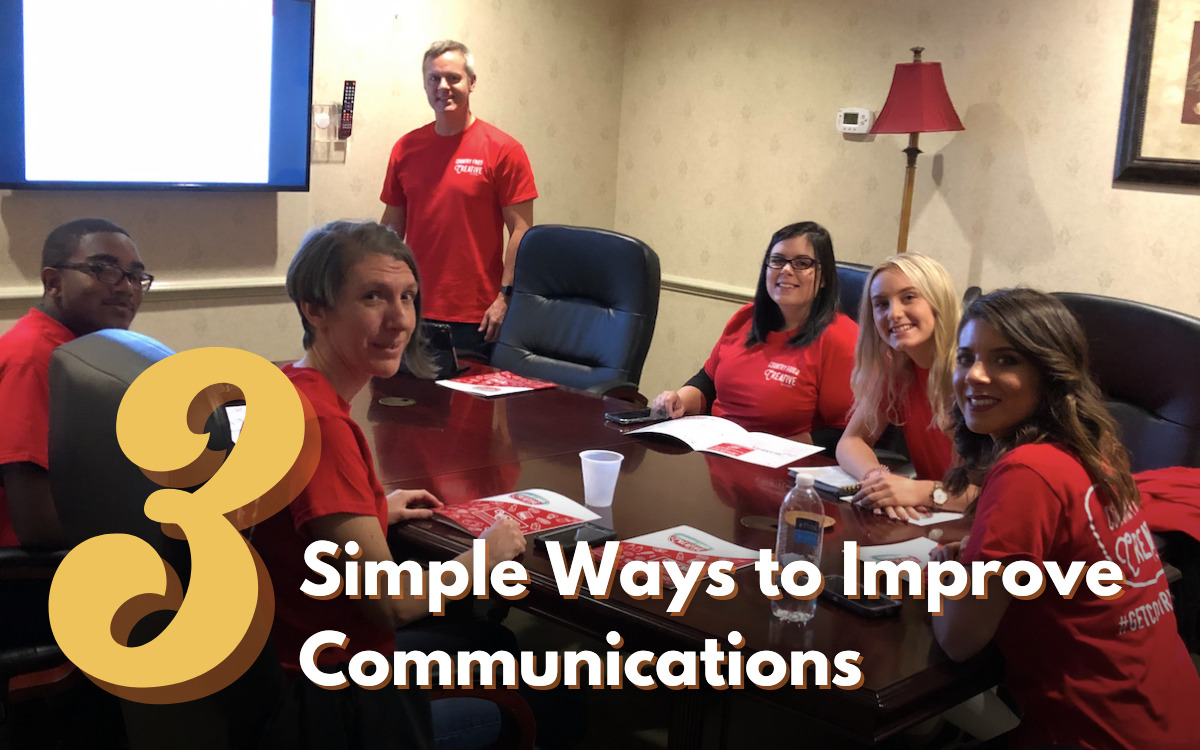As a society, we have more ways to communicate with each other than at any other time in history. Yet, I can’t think of a time when communicating with our fellow humans has been so broken. We could all use a lesson in how to improve communication skills. There are so many things to talk about and so many ways to do it, yet very little communication is happening.
We see the adverse effects of miscommunications in politics, foreign relations, markets, jobs, and even at home. I don’t think it’s fair to blame that on technology, the fault lies with the users of communications technology.
Here at Country Fried Creative, we help our clients communicate. As a marketing agency, we have a team of professionals trained to help clients communicate with their target market. In fact, our Vision Statement is “Foster meaningful online connections that make the community better for all concerned.” You can read more about our Mission, Vision, and Values here. Even though we’re professionals, we’re also human and make mistakes.
Recently, a colleague of mine pointed out a communication mistake I was continuing to make with others by not listening fully. This got me thinking, and I began to reflect upon ways I could communicate more effectively. Here’s a list of three simple ways to improve communications with others.
1. Meet people where they are:
As a general rule, if someone contacts me on a particular platform (like an email) then I reciprocate and reply using that same method. If someone calls me, then I call them back. When I receive a text message, then I text them back and so forth. I believe that’s both polite and respectful. Assuming you are the one initiating the communications, then it’s also polite to be prepared for a response. Like most of you, I receive a lot of emails. If it’s an email that requires a response, I always try to respond within a business day.
I can’t tell you the number of times I’ve had to call or text the original sender to nudge them to check their own email to get the response they requested in the first place. Provided you’re a marketer, you know that you need to reach your target market where they’re at and be prepared for a response. Be easy to communicate with and meet people where they are. Don’t be that person who expects everyone to meet you on your level. Come to the “middle” and meet people where they are.
2. listen first:
One of my favorite business books is “The Seven Habits of Highly Effective People” by Stephen Covey. Habit #5 in the book is “Seek First to Understand, Then to Be Understood”. I’m especially bad at not listening completely. As a problem solver, I’m anxious to get to the crux of the matter and offer solutions. Not everything is a problem that needs to be fixed. Sometimes people want to talk just to be heard.
As a middle-aged, white male, listening isn’t easy. Contrary to what I may think, I haven’t seen it all, and I don’t need to take the lead on everything. I resolve to do better to be present and listen more, especially with those that may communicate in ways different from me. It’s only by listening that we can understand. Take notes while listening so that you can accurately capture what’s being said. Note-taking seems to be a dying art, yet it’s often the key to ensuring that you’ve heard what was said.
3. be clear:
Once you meet people where they are and listen first, you are more likely to be heard if you are clear about what you are saying when it’s your turn to communicate. Your target audience may have a different definition of clarity than you. If you are communicating with a detail-oriented person, then clarity might mean providing particular details. Are you speaking with a big picture person? Stay focused on the big picture concepts. If you’re having a dialog with someone who just wants to be heard, then use your chance to talk by affirming parts of their dialog to show that you heard them. The following advice has been attributed to FDR, Woodrow Wilson, and many others (truth is, no one knows who first said it) – “Be sincere; be brief; be quiet.”
Let’s resolve to communicate more effectively together at home, in the workplace, and in our community. I hope these simple steps will help you to improve your communication skills. I’m looking forward to hearing what you have to say.
Joe




